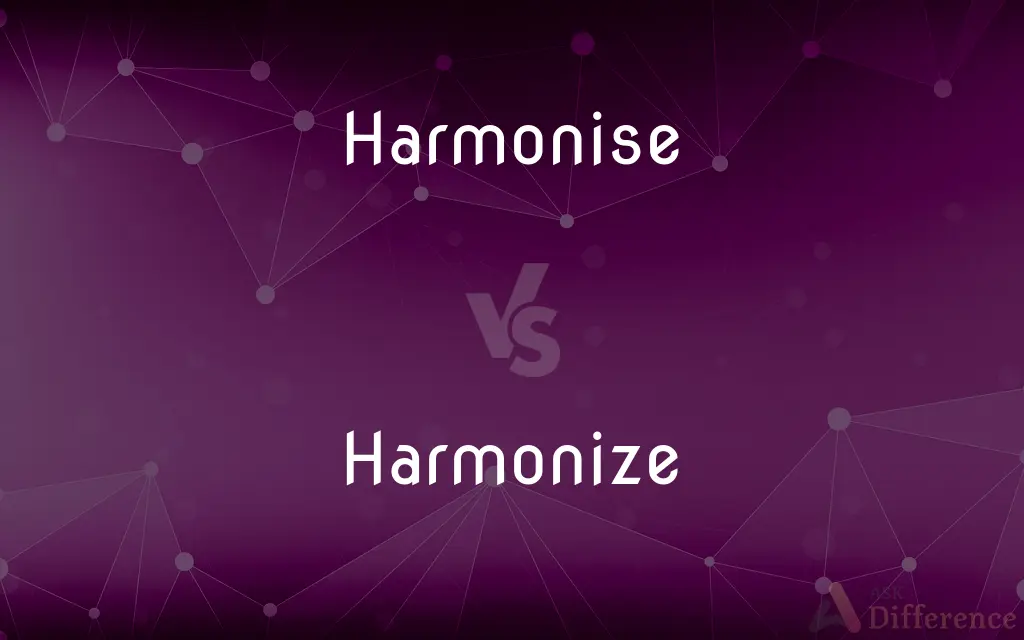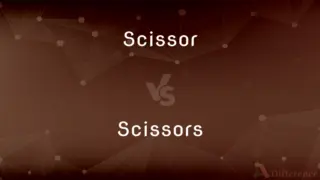Harmonise vs. Harmonize — What's the Difference?
By Fiza Rafique & Urooj Arif — Updated on March 13, 2024
"Harmonise" and "Harmonize" primarily differ in spelling based on regional English variations; "harmonise" is British English, while "harmonize" is American English.

Difference Between Harmonise and Harmonize
Table of Contents
ADVERTISEMENT
Key Differences
Both "harmonise" and "harmonize" refer to the process of creating harmony or agreement, be it in music, social relationships, or ideas. The main difference lies in the spelling, with "harmonise" being the preferred form in British English and "harmonize" in American English. This distinction is similar to other words that end in "-ize" or "-ise," like "realize" and "realise."
In terms of usage, "harmonise" might be more commonly found in texts or publications adhering to British English standards, such as those from the UK, Australia, and other Commonwealth countries. Conversely, "harmonize" is prevalent in American publications and is the standard in American English. The choice between the two does not affect the meaning of the word but is more about adhering to regional spelling conventions.
When it comes to etymology, both variants derive from the Greek word "harmonia," meaning a combination or agreement, and entered English through Latin and French influences. Over time, English adopted different spelling conventions in the US and the UK, leading to the current variations.
In practical terms, whether to use "harmonise" or "harmonize" depends on the intended audience or the prevailing language standards of the publication or document. Both forms are correct within their respective versions of English, and the choice between them does not imply a difference in meaning or application.
Comparison Chart
Spelling
British English
American English
ADVERTISEMENT
Usage
Common in the UK, Australia, and other Commonwealth countries
Predominant in the United States
Meaning
To create harmony or agreement
To create harmony or agreement
Etymology
Derived from Greek "harmonia" through Latin and French
Derived from Greek "harmonia" through Latin and French
Regional Preference
Preferred in texts adhering to British English standards
Standard in American English publications
Compare with Definitions
Harmonise
Characterized by the "ise" ending.
In British English, it is common to harmonise spelling with regional preferences.
Harmonize
To bring into agreement or harmony.
The peace treaty aimed to harmonize relations between the two countries.
Harmonise
More common in British English contexts.
British authors tend to use harmonise in their writings.
Harmonize
Predominant in American English.
American publications consistently use harmonize.
Harmonise
To bring into agreement or harmony.
The choir director worked to harmonise the voices of the singers.
Harmonize
Used in music, social science, and international relations.
Efforts to harmonize international laws have increased.
Harmonise
Preferred by readers familiar with British English.
English literature from the UK often uses harmonise.
Harmonize
Features the "ize" ending.
American English favors the ize spelling, as in harmonize.
Harmonise
Used in discussions of music, relationships, and policy.
The new regulations aim to harmonise trade standards across Europe.
Harmonize
Suitable for an American English-speaking audience.
American readers are accustomed to the spelling harmonize.
Harmonise
Standard spelling of harmonize
Harmonize
To bring or come into agreement or harmony.
Harmonise
Go together;
The colors don't harmonize
Their ideas concorded
Harmonize
(Music) To provide harmony for (a melody).
Harmonise
Write a harmony for
Harmonize
To be in agreement; be harmonious.
Harmonise
Sing or play in harmony
Harmonize
(Music) To sing or play in harmony.
Harmonise
Bring into consonance or relate harmoniously;
Harmonize the different interests
Harmonize
(intransitive) To be in harmonious agreement.
Harmonise
Bring into consonance or accord;
Harmonize one's goals with one's abilities
Harmonize
To play or sing in harmony.
Harmonise
Bring into consonance, harmony, or accord while making music or singing
Harmonize
To provide parts to.
Harmonize
(transitive) To bring things into harmony, or to make things compatible.
Harmonize
(transitive) To provide the harmony for a melody.
Harmonize
To agree in action, adaptation, or effect on the mind; to agree in sense or purport; as, the parts of a mechanism harmonize.
Harmonize
To be in peace and friendship, as individuals, families, or public organizations.
Harmonize
To agree in vocal or musical effect; to form a concord; as, the tones harmonize perfectly.
Harmonize
To adjust in fit proportions; to cause to agree; to show the agreement of; to reconcile the apparent contradiction of.
Harmonize
To accompany with harmony; to provide with parts, as an air, or melody.
Harmonize
Go together;
The colors don't harmonize
Their ideas concorded
Harmonize
Write a harmony for
Harmonize
Sing or play in harmony
Harmonize
Bring into consonance or relate harmoniously;
Harmonize the different interests
Harmonize
Bring into consonance or accord;
Harmonize one's goals with one's abilities
Harmonize
Bring into consonance, harmony, or accord while making music or singing
Common Curiosities
Do "harmonise" and "harmonize" have the same etymology?
Yes, both variants come from the same Greek origin, differing only in regional spelling conventions.
Can I use "harmonise" in American English?
While "harmonise" is understood in American English, "harmonize" is the standard spelling.
Does the spelling difference affect pronunciation?
No, "harmonise" and "harmonize" are pronounced the same way.
Is "harmonize" acceptable in British English?
"Harmonize" may be used in British English, but "harmonise" is the preferred form.
Which spelling should I use, "harmonise" or "harmonize"?
The choice depends on your audience or the regional spelling standards you are following.
How can I remember which spelling to use?
Consider the audience or the predominant English variant in your region to guide your spelling choice.
Is there a difference in meaning between "harmonise" and "harmonize"?
No, the difference is purely in spelling; the meaning remains the same.
In academic writing, which spelling should I use?
Follow the spelling conventions of the English variant preferred by the publication or institution.
In music theory, does "harmonise" have a different meaning than "harmonize"?
No, in music theory, both spellings refer to the same concept of creating harmonic combinations.
Can using the "wrong" variant affect my writing's reception?
While unlikely to cause significant misunderstanding, consistent use of the appropriate regional spelling enhances the professionalism of your writing.
Has the spelling difference always existed?
The divergence in spelling conventions between British and American English developed over time, particularly from the 18th century onwards.
Is there a trend towards standardizing the spelling between British and American English?
While some global communication and digital platforms might blur regional spelling distinctions, formal writing still adheres to established conventions.
Are there other words that have similar British and American English variations?
Yes, many words have different spellings in British and American English, such as "realise/realize" and "colour/color."
Are there software tools that can automatically adjust spelling based on regional preferences?
Yes, many word processing and editing software offer settings to adhere to either British or American English spelling conventions.
Do dictionaries list both spellings?
Yes, most comprehensive English dictionaries will list both variants and indicate their regional usage.
Share Your Discovery

Previous Comparison
Consonant vs. Alphabet
Next Comparison
Scissor vs. ScissorsAuthor Spotlight
Written by
Fiza RafiqueFiza Rafique is a skilled content writer at AskDifference.com, where she meticulously refines and enhances written pieces. Drawing from her vast editorial expertise, Fiza ensures clarity, accuracy, and precision in every article. Passionate about language, she continually seeks to elevate the quality of content for readers worldwide.
Co-written by
Urooj ArifUrooj is a skilled content writer at Ask Difference, known for her exceptional ability to simplify complex topics into engaging and informative content. With a passion for research and a flair for clear, concise writing, she consistently delivers articles that resonate with our diverse audience.
















































